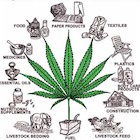Key Benefits
Naturally resistant
Hemp is naturally resistant to most pests, so very little herbicides or pesticides are used to grow it. It can be grown very close together, so it maximizes the use of the land and crowds out the weeds. It is an excellent crop for crop rotation. It builds up and revitalizes the soil by aerating the soil and depositing carbon dioxide, so a food crop could be planted immediately after a hemp harvest without leaving the land fallow. Hemp grows in a wide variety of climates and soil types.
Substitute for cotton
It is a natural substitute for cotton and wood fiber. Hemp is 10 times stronger than cotton and is one of the strongest plant fibers. Cotton only grows in warm climates and requires enormous amounts of water. Cotton requires enormous pesticide use; 50 percent of all pesticides used in the U.S. are used on cotton. Hemp requires no herbicides and few or no pesticides and it grows in all 50 states. Hemp produces 250 percent more fiber that cotton and 600 percent more fiber than flax using the same amount of land.
Ready to harvest quickly
Within four months of being planted, hemp grows 10 to 20 feet tall. This will save chopping down millions of trees and destroying wildlife habitat. It will prevent erosion of topsoil due to logging and reduce pollution of lakes, rivers and streams. Hemp can be pulped using fewer chemicals than wood because of its low lignin content. Its natural brightness can obviate the need to use chlorine bleach. A single acre of hemp can produce four times more paper than one acre of trees.

 in English
in English  Eesti keeles
Eesti keeles  По-русски
По-русски  Latviešu
Latviešu 